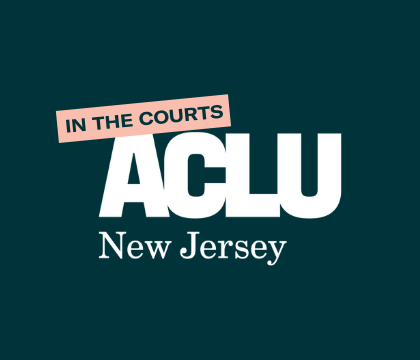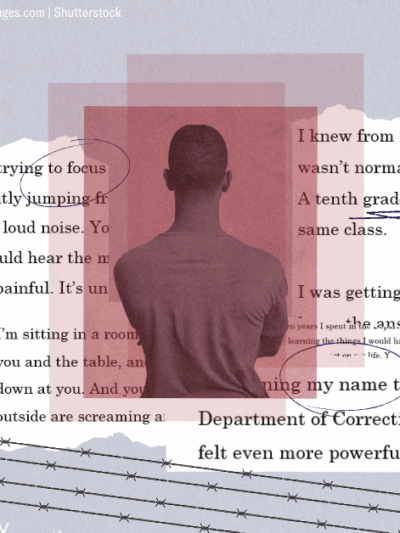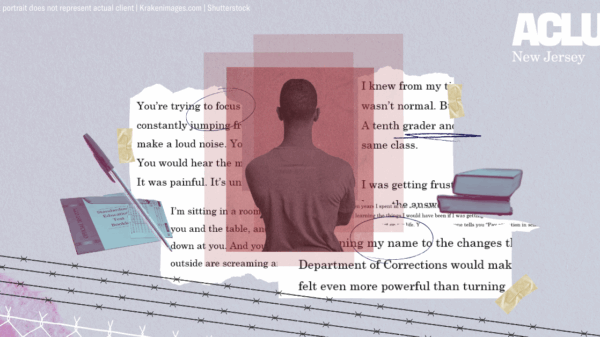Adam X v. NJ Departments of Corrections and Education
- Filed: January 11, 2017
- Status: Filed
- Court: U.S. District Court for the District of New Jersey
- Latest Update: Jun 29, 2018

Challenge to the NJDOC and NJDOE’s failure to provide, and monitor the provision of, appropriate special education and related services to young people with disabilities in adult prisons in violation of federal law.
The ACLU of New Jersey and its co-counsel Disability Rights Advocates and Proskauer Rose LLP filed a federal class action lawsuit against the New Jersey Department of Corrections (NJDOC) and Department of Education (NJDOE) for failing to provide a free, appropriate, public education to students with disabilities in adult prisons, in violation of the Individuals with Disabilities Education Act (IDEA), Section 405 of the Rehabilitation Act, and the Americans with Disabilities Act. The lawsuit sought a comprehensive remedial plan and monitoring to ensure that eligible students are identified, and appropriate services are provided.
In May 2017, the Court appointed a neutral expert to review and evaluate the NJDOC’s provision of special education – and the NJDOE’s oversight of it – in order to recommend solutions. Following submission of the Court-ordered expert report in 2018, the parties engaged in three years of settlement negotiations.
In July 2021, the parties signed a settlement agreement requiring the adoption of new policies by the NJDOC and a robust monitoring role for the NJDOE, supported by a Court-appointed External Monitor, for a period of five years. The new policies (linked below) are designed to, among other things:
- Identify students who are eligible for special education;
- Develop and implement Individualized Education Plans and Section 504 Plans according to the individual needs of each student;
- Provide individualized transition services to eligible students;
- Provide at least four hours of instruction per day in a regular classroom setting, except in limited circumstances;
- Limit the use of “cell study” to certain limited circumstances and provide the opportunity for in-person instruction even in those circumstances;
- Prohibit the use of worksheets as the primary method of educational instruction.
- Require the use of appropriately certified teachers and evidence-based instructional methods;
- Develop and implement behavioral assessments and plans and conduct “manifestation determinations” for disciplinary incidents that occur during the day and result in a disciplinary charge (to determine whether those incidents were a manifestation of the student’s disability);
- Take specific steps to ensure conditions of education for students in close custody units reflect classrooms in the general population; and
- Provide interpretation and translation services to students with disabilities who are not fluent in English.
The settlement agreement also provides for the establishment of a compensatory education program.
The case is captioned Adam X., et al. v. New Jersey Department of Corrections and Department of Education, et al.
On March 3, 2022, after holding a Fairness Hearing, Judge Freda L. Wolfson, Chief Judge of the District of New Jersey, granted final approval of the settlement agreement and fees. The Court’s Opinion and Order are hyperlinked below.
The Court allowed the case to proceed as a class action on behalf of people who were incarcerated in NJDOC custody any time on or after January 11, 2015, and were or should have been identified as being entitled to special education services. It also includes anyone who entered custody under age 18, and without a high school diploma, during those years. It is estimated that the agreement impacts over 400 class members.
The Final Approval ruling came after a months-long notice period, in which class members were contacted with information about the settlement agreement, including the Notice and Compensatory Education Form hyperlinked below. Although the notice period is complete, class members and their loved ones may still reach out to class counsel at prisoneducation@aclu-nj.org or prisoneducation@dralegal.org or by calling 973-854-1700.
Class members may continue to submit Compensatory Education Forms for up to two years.
- Adam X: One-Page Flyer
- Adam X: Amended Complaint
- Adam X: Settlement Agreement with Exhibits
- Adam X: Updated Class Notice/Updated Full Notice Package
- Adam X: Compensatory Education Form
- Adam X: Order Granting Preliminary Approval and Certifying Class
- Adam X: Order Extending Deadlines
- Adam X: NJDOC Policies - SFEA Student-Inmate Intake: Records Requests and Enrollment
- Adam X: NJDOC Policies - Special Education Procedural Safeguards
- Adam X: NJDOC Policies - Special Education Staff Qualifications & Development
- Adam X: NJDOC Policies - Student Records: Discharge & Receipt of Records
- Adam X: NJDOC Policies - Makeup Instruction for Special Education SFEA Student-Inmates & Scheduling Form
- Adam X: NJDOC Policies - Educational Transition Planning for SFEA Students
- Adam X: NJDOC Policies - Manifestation Determination
Court: U.S. District Court for the District of New Jersey
Affiliate: NJ
Download documentCourt: U.S. District Court for the District of New Jersey
Affiliate: NJ
Download documentCourt: U.S. District Court for the District of New Jersey
Affiliate: NJ
Download documentCourt: U.S. District Court for the District of New Jersey
Affiliate: NJ
Download documentCourt: U.S. District Court for the District of New Jersey
Affiliate: NJ
Download documentCourt: U.S. District Court for the District of New Jersey
Affiliate: NJ
Download documentCourt: U.S. District Court for the District of New Jersey
Affiliate: NJ
Download documentCourt: U.S. District Court for the District of New Jersey
Affiliate: NJ
Download documentCourt: U.S. District Court for the District of New Jersey
Affiliate: NJ
Download documentCourt: U.S. District Court for the District of New Jersey
Affiliate: NJ
Download documentCourt: U.S. District Court for the District of New Jersey
Affiliate: NJ
Download documentCourt: U.S. District Court for the District of New Jersey
Affiliate: NJ
Download documentCourt: U.S. District Court for the District of New Jersey
Affiliate: NJ
Download documentCourt: U.S. District Court for the District of New Jersey
Affiliate: NJ
Download documentA Student’s Journey: Fighting for Education Rights while in Prison
Young people with disabilities have a legal right to a free and appropriate public education, even when they are incarcerated. But for years, the educational needs of high school students in New Jersey’s state prisons were not being met. That’s changing now, and Brian Y. is a big reason why.


Learn More About the Issues in This Case
Related News & Podcasts

- Prisons & Jails|
- +2 Issues
A Student’s Journey: Fighting for Education Rights while in Prison
Stay Informed
Sign up to be the first to hear about how to take action.
By completing this form, I agree to receive occasional emails per the terms of the ACLU’s privacy statement.
By completing this form, I agree to receive occasional emails per the terms of the ACLU’s privacy statement.
